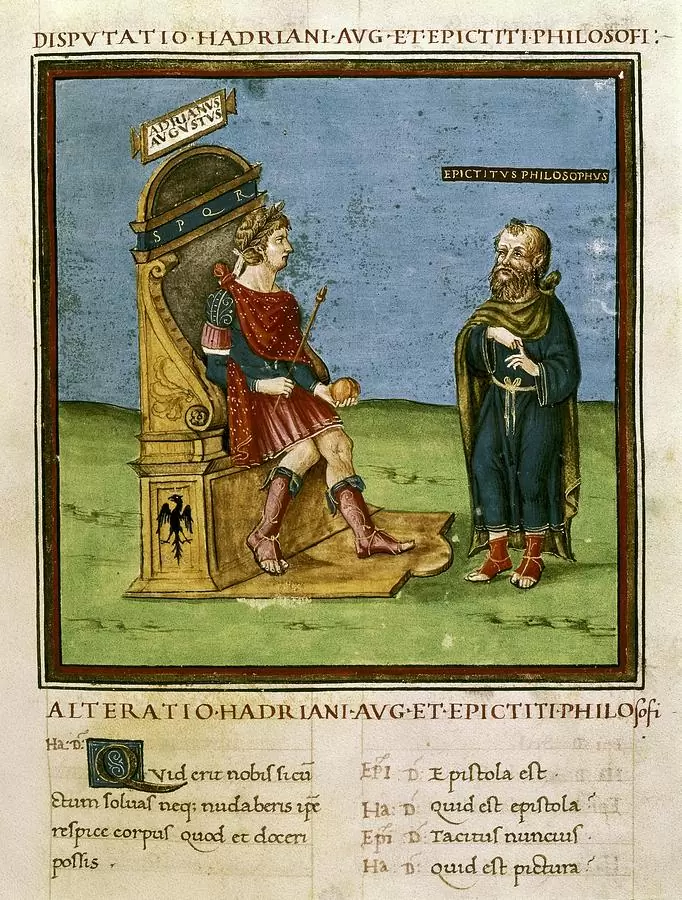Today's Sunday • 10 mins read
— By Dr. Sandip Roy.
Epictetus was a Stoic master who lived and taught in the early second century CE, around four hundred years after Zeno of Citium founded Stoicism.
From the beginning, the Stoics held that living with virtue was both necessary and sufficient for a happy life. After Zeno, Stoicism prospered under many of its practitioners from various walks of life.
Epictetus (pronounced Epic-TEE-tus) was one of the three most prominent figures in the Stoic school of thought, together with Seneca and Marcus Aurelius.
“Demand not that events should happen as you wish; but wish them to happen as they do happen, and your life will be serene.” — Epictetus
Early Life of Epictetus
Epictetus (50-135 CE) was a Greek philosopher who was born into a slave family in Hierapolis in Phrygia, the city now known as Pamukkale in western Turkey.
We know very little about his early years. Even his original name is unknown, and the name Epictetus comes from epiktētos, a Greek word meaning “acquired.”
Historians think his parents sold him as a child slave to Epaphroditus, a secretary to Roman Emperor Nero.
If we are to believe Origen’s “Contra Celcus,” Epaphroditus was a cruel master, though he was a former slave, and his mistreatment crippled Epictetus for life.
Education of Epictetus
Despite his long days of hard labor, Epictetus made time to educate himself and eventually became a teacher himself.
During his breaks, he would ask permission to walk around the marketplace, where he would listen to the many teachers lecturing there.

He routinely attended the lectures of the famous Stoic mentor Musonius Rufus, whose teachings and philosophy had a great influence on him.
From Musonius Rufus, he also learned how to captivate an audience, which helped him later become a brilliant teacher.
When he was freed by his slave master, Epictetus went on to establish himself in Rome as a teacher who could explain the complex ideas of Stoicism in layman’s terms.
People knew him for his ability to connect with his students and his practical approach to philosophy.
What can we learn from the life of Epictetus?
Epictetus’ timeless teachings can guide those facing hard times to persevere in their path toward their goal.
1. Persistence and Resistance
Given his tragic circumstances, it is unimaginable that Epictetus became what he was never meant to become.
But he rose above the massive hurdles of being born to slave parents and serving under a cruel slave master. He made time to time to attend public lectures and study with tutors.
“Circumstances don’t make the man, they only reveal him to himself.” — Epictetus
His life teaches us the value of perseverance (resilience) and determination (grit and courage) in the face of adversity.
2. Acceptance And Virtue
Three precious pearls from Epictetus’ teachings, which he taught all his life:
- accept whatever life brings,
- be good whether anyone is watching or not, and
- do not get swayed by either good fortune or bad fortune.
3. Stoic Lessons From Epictetus
- You become what you give your attention to.
- You cannot learn what you think you already know.
- Demand the best from yourself without waiting any more.
- To improve, you have to accept that you might look foolish.
- It’s not what happens to you, but how you react to it that matters.
- To be happy, stop worrying about things that are beyond your control.
- Your wealth is not in having great possessions, but in having few wants.
Philosophy of Epictetus
Epictetus had already discovered philosophy through Musonius Rufus, a well-known teacher of Stoicism, whose lectures he used to attend when his owner gave him time to relax.
He was freed from slavery shortly after Emperor Nero’s death, around the year 68 CE.
He began teaching Stoic philosophy in Rome soon after and continued to do so for the next 25 years.
Formally, his school taught interpretation and discussion of classic Stoic texts. But Epictetus’ forte was that he taught philosophy as a way of life and a means of moral growth, not just a theoretical study.
Arrian, his most famous student, described Epictetus as a powerful speaker who could “induce his listener to feel just what Epictetus wanted him to feel.”
Epictetus was an orthodox Stoic philosopher, but his thoughts also had influences from Socrates and Diogenes the Cynic.
Epictetus developed the idea of prohairesis, translated as “will” or “rational decision.”
He emphasized that we must learn to distinguish between what is in our power (prohairetic things) and what is not in our power (aprohairetic things).
The things in our power are our opinions, impulses, desires, and aversions. Things that are not in our power are external things—our assets, status, power, our bodies, and what others think and do.
When we accept that we cannot control external things, we realize that we can find everything we need to live a happy life within ourselves.
Epictetus teaches that the preconceptions (prolepsis) of good and evil are common to all.
“Two maxims we must ever bear in mind—that apart from the will there is nothing good or bad, and that we must not try to anticipate or to direct events, but merely to accept them with intelligence.” — Epictetus
He believed in cosmopolitanism, that every person is connected to the rest of the world, and that the universe is designed for universal harmony.
Epictetus also taught that it is our opinions and principles that can us unhappy, and it is only the ignorant person who finds fault with another.
When Emperor Domitian expelled all philosophers from Rome, Epictetus fled to Nicopolis, Greece, in 90 CE and established a philosophy school, where he lectured until his death.
Epictetus’ Three-Stage Model for Moral Progress
Epictetus explained:
- Discipline of Desire (prohairesis/apatheia aim): Train desires and aversions so they aren’t frustrated; want only what’s up to you.
- Discipline of Assent (impressions and judgment): Learn to judge impressions; withhold automatic assent and permit only what accords with reason.
- Discipline of Action (appropriate action; oikeiôsis extended): Translate right desire and right judgment into correct, socially responsible action.
Together, they move a person from internal reorientation (desire), through cognitive control (assent), to outward moral conduct (action). Practical exercises include negative visualization or premeditatio malorum, examining impressions, and role-based duties.

Influence of Epictetus
- Emperor Hadrian was welcoming to Epictetus and asked him many questions.
- In Meditations, Marcus Aurelius thanks his tutor Junius Rusticus for introducing him to Epictetus.
- The philosophy of Epictetus plays a central role in the novel A Man in Full by Tom Wolfe.
- Psychologist Albert Ellis, the founder of Rational Emotive Behavior Therapy (REBT), credited Epictetus for laying a foundation for his psychotherapy method.
Legacy of Epictetus
Epictetus was well-liked because he made Stoicism accessible to a wide range of people, and his legacy has lasted for millennia after his death.
Because of his practical approach to philosophy, Epictetus enjoys a large following among modern Stoics today, second only to Marcus Aurelius.
His philosophy also had a major impact on other philosophers, and his work is studied and debated to this day.
Later philosophers, as well as many modern thinkers, were impressed by his emphasis on living in accord with nature and accepting one’s circumstances.
Epictetus’s work has been translated into many languages and continues to inspire and guide those interested in Stoicism and living a virtuous and meaningful life.
Philosophical Works of Epictetus
Epictetus never wrote anything down.
We are fortunate that his student Arrian recorded his lectures in a series of books called Discourses. These volumes contain Epictetus’ thoughts on a wide range of topics, including ethics, politics, and psychology.
Out of the original eight, however, only four volumes of Discourses survive today.

The above is from The Daily Stoic: 366 Meditations on Wisdom, Perseverance, and the Art of Living by Ryan Holiday and Stephen Hanselman.
Enchiridion, which translates as a “Manual” or “Handbook,” is a short book compiling Epictetus’ main thoughts and ideas. It contains many of his maxims on Stoicism.
In both, he discusses the importance of reason in guiding one’s actions and in achieving happiness in life.
Most of Epictetus’s philosophical lectures are understandable to the average person.
In a preface to the Discourses, Arrian writes:
“Whatever I heard him say I used to write down, word for word, as best I could, endeavouring to preserve it as a memorial, for my own future use, of his way of thinking and the frankness of his speech.”
6 Key Lessons from Epictetus’s Discourses
- All humans are rational and have a mind that is a reflection of the universal mind, Zeus.
- The root of human suffering comes from the failure to separate things that are within our control from those that are not.
- Things within our control include our judgments, intentions, desires, and aversions, while things outside our control include external events, other people, and functions of our bodies (dichotomy of control).
- To avoid suffering, we must focus on the things within our control and let go of the illusion of control over external events. It can let us free ourselves to pursue more important things in life.
- We are responsible for our emotions and state of mind, and education is key to learning to control them.
- Things and events are not inherently good or bad, but rather it is our interpretation of them that gives them meaning.
Epictetus’ Famous Quotes
“It is impossible for a man to learn what he thinks he already knows.”
“To make the best of what is in our power, and take the rest as it occurs.”
“I cannot escape death; but cannot I escape the dread of it? Must I die trembling and lamenting?”
“Who is your master? Anyone who has control over things upon which you’ve set your heart, or over things which you seek to avoid.”
“No thing great is created suddenly, any more than a bunch of grapes or a fig. If you tell me that you desire a fig, I answer you that there must be time. Let it first blossom, then bear fruit, then ripen.”
“Let death and exile, and all other things which appear terrible, be daily before your eyes, but death chiefly; and you will never entertain any abject thought, nor too eagerly covet anything.”
“Never call yourself a philosopher, nor talk a great deal among the unlearned about theorems, but act conformably to them. Thus, at an entertainment, don’t talk how persons ought to eat, but eat as you ought.”
“Some things are in our control and others not. Things in our control are opinion, pursuit, desire, aversion, and, in a word, whatever are our own actions. Things not in our control are body, property, reputation, command, and, in one word, whatever are not our own actions.”
How did Epictetus die?
The exact circumstances around the death of Epictetus are unknown, and most probably he died of old age when he was 85 years old, in 135 CE, in Nicopolis. After his death, according to Lucian, an admirer purchased his oil lamp for 3,000 drachmas.
Final Words
Epictetus held his calm in the presence of both the prosperous and the penurious, certain that nothing external could harm him or his judgment, being confident in the divine fate.
Epictetus’s life is a great illustration of how education can change people’s lives. He educated himself to unlock his potential and build a better life for himself and others.
His persistence and indomitable spirit made him a teacher and philosopher respected long after his death.
√ Also Read: Dichotomy of Control: Stoic Peace For Modern Problems
√ Please share this with someone.
» You deserve happiness! Choosing therapy could be your best decision.
...
• Disclosure: Buying via our links earns us a small commission.